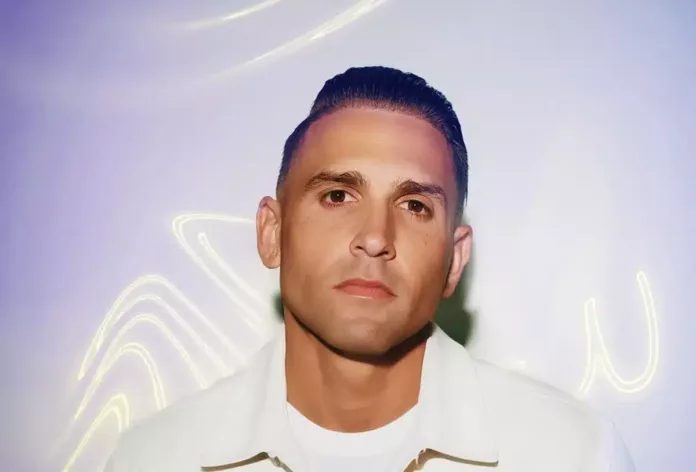
Joesef: Scottish soul-pop hero turning vulnerability into a rallying cry
Joesef is on stage at Glasgow’s SWG3 Galvanizers. It’s December 2019 and he’s headlining the 1250-capacity venue, making this his biggest show to date – but he’s speechless for reasons beyond the obvious. When the Scottish singer-songwriter looks out to the crowd in front of him, he suddenly finds himself in a fever dream scenario: standing there is his ex. Y’know, only the one that inspired all of the gorgeous, heartbreak-strewn songs that brought people to this very room.
“In that moment, it felt like the whole crowd disappeared. He was the first person I saw, and it made me very self-conscious,” says the 26-year-old, as he retells the story to NME almost two years later. He takes an enormous, reflective pause, from which you fear he may never return. “But then I looked back out there and I was like, ‘Get over it!’,” he exclaims, half-laughing, half-serious.
So-awkward-it-hurts run-in aside, something extraordinary happened that night. For Joesef, who released his debut EP ‘Play Me Something Nice’ earlier that year, the show was proof that his impact on his hometown – and those that lived there – had become unavoidable.

Things had moved at an astonishing pace: only nine months prior, he had played his debut show at King Tut’s Wah Wah Hut – the same venue where Creation Records founder Alan McGee famously signed Oasis in May 1993. Joesef sold that gig out, too, off the back of a “ridiculous” word-of-mouth campaign that spread through his locale. Crucially, at that point, he hadn’t even released any music online.
But he spoke directly to his audience because he was his audience: young, hopeful, and proud of their upbringing. Born in Garthamlock, a suburb within Glasgow’s lively East End, Joesef’s talent is in how he takes the retro splendour and swooning arrangements of soul, and makes it more relatable to people like him, conjuring verses about love (falling in and out of it, then finding it for yourself) in your early twenties, and a fascination with the characters that make up your community. Yet his voice – rugged and graceful – is the central character of the music, and he has previously been likened to James Blake. This is not a comparison that he has ever really welcomed, though: “I don’t really take all of that stuff seriously… but it’s better than being matched up to like, fucking Mr. Blobby!”.
We are in a coffee shop in east London – Joesef’s new stomping ground – to talk about the past few years and his rousing new sound. In conversation, he seems world-weary, but equally eager to learn everything at once about the new, vibrant city he now finds himself in. The songs, meanwhile, remain smooth and introspective, with shadings of brass that allow them teeter on the fringes of jazz. Only this time around, as showcased on recent single ‘Fire’, there is a real defiance – a leap from his second EP, 2020’s ‘Does It Make You Feel Good?’, which explored every angle of a breakup through sensitive storytelling.
After separating from his partner early last year, Joesef found himself on the precipice of a rude awakening. He realised that he needed to get away from everything that his city had given him: the people, the routines, the emotional weight. “There were issues in my life that I thought were attached to Glasgow, so I needed a way out,” he explains. “I’ve always been someone that puts emotions onto physical items. At home, I would say shit like, ‘Oh my god, [my ex] used to sit on that couch.’” His nose wrinkles at the thought of his previous situation. “I was clinging onto the past. I needed to move because my house felt alive with bad memories.”
He gives voice to this fear on ‘Fire’, which was written while he was settling into the Big Smoke, and had realised that his heavy thoughts had travelled south with him: “Now I can’t bear the burden of what I’m yet to find,” he sings. “This place ain’t big enough for me and what’s left behind”.
“When I got to London, I started to think, ‘Why do I feel fucking terrible?’. I knew that I should’ve been feeling on top of the world; I have such a strong sense of who I am, what I want to be, and where I want to be”, says Joesef. “But I had to soldier on. It’s the sort of experience that changes you, and leaves you a different person than you were before, back home.”
Does he feel guilty about moving so far away from the East End?
“Mm,” he says. Joesef is leaning forward now, hands folded around his glass of orange juice. “I have always wanted to not just do good for the East End, but remain myself. In the music industry, you get put in a lot of spaces where you’re left to feel like a wild animal compared to other people; it’s crazy how so many come from wealthy families or nepotism,” he says. “So for people from home to look back at me – a local boy that has done well for himself – might make them feel like they can achieve things, too.”

NME brings up something that Joesef joked about earlier: being compared to James Blake. Three years ago, the latter urged people to stop labelling him as a “sad boy”, just because he is vulnerable and emotional in his songwriting. A quick Google search displays that the same term is still being used to describe Joesef in 2021 – but has anyone ever asked him if he’s OK with that?
“I am grateful that I get to make brighter stuff out of awful experiences,” he offers, with a self-assured nod. “But the ‘sad boy’ label definitely trivialises the trauma aspect of being depressed, and that needs to change; it reduces the intensity of the experiences that someone has decided to share through their music.”
He continues: “But it’s the same story with female acts. They’re always labelled as ‘confessional’ when sharing their life experiences – but they’re just being honest! It’s embarrassing to me.”
While Joesef acknowledges the challenges that can come with sharing his “purely autobiographical” lyrics with the world, he reaffirms that the new music will delve further into both the discoveries and hardships that continue to shape his early adulthood years – including a recently rekindled romance with a certain someone.
“Well, we got back together… and then broke up again,” he says, sheepishly laughing. “But I learned a massive lesson in that whenever you go back to a person or a place, they won’t be the same anymore. And I’m OK with that.”
Joesef’s new single ‘Fire’ is out now
Radar Roundup: sign up and get our weekly new music newsletter



